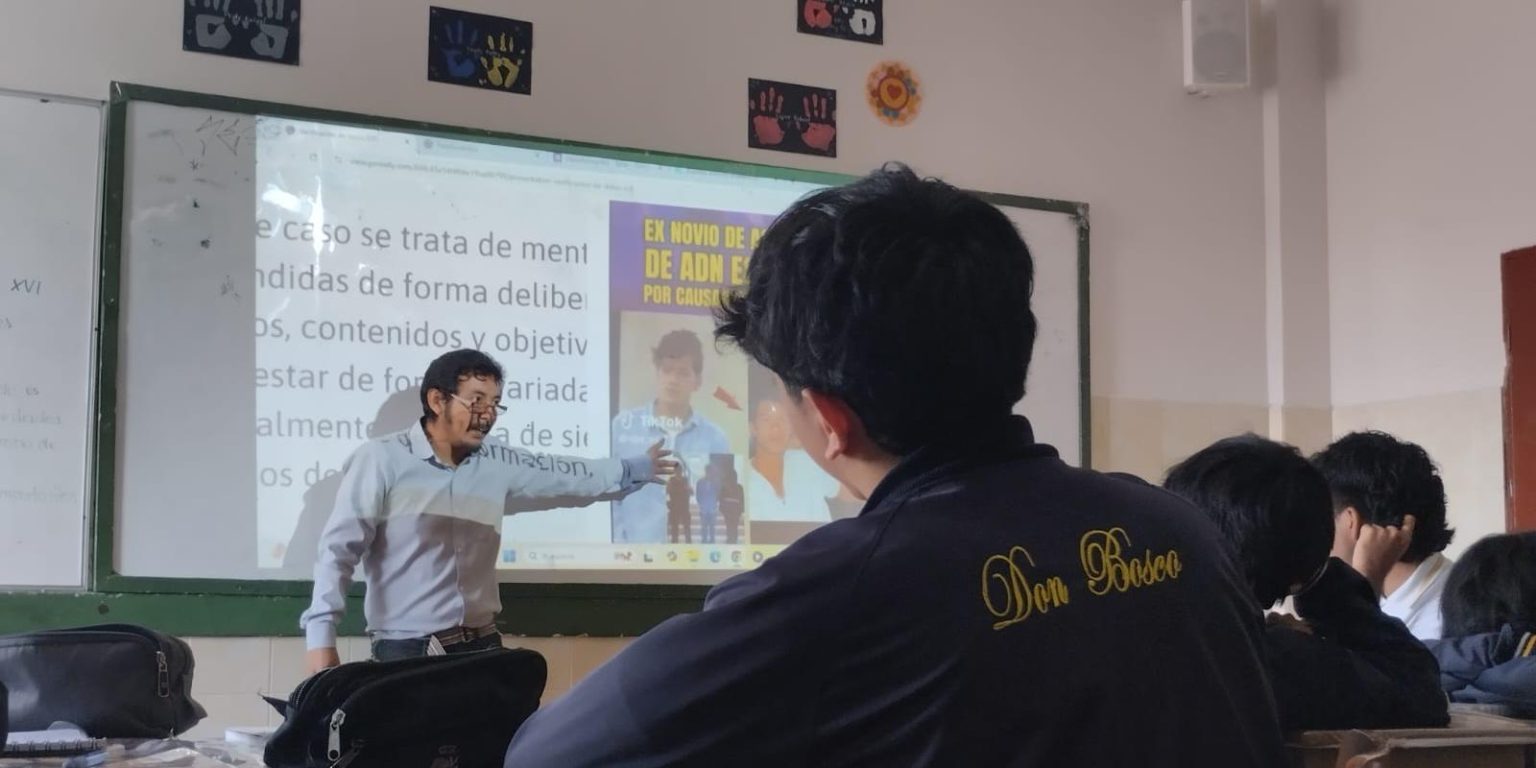Listen to the article
In Ecuador, a dual-career educator is transforming how high school students engage with online information, creating a new generation of digital skeptics equipped to combat misinformation.
Gabriel Narváez, who works as both a high school history teacher and fact-checker, has successfully bridged his professional worlds through media literacy workshops that reached 134 high school seniors. His initiative forms part of the broader “Disarming Disinformation” program, a three-year collaboration between the International Center for Journalists (ICFJ) and the Poynter Institute’s MediaWise project.
“We should start with a culture that fosters proactive methodical doubt,” Narváez explains. “We must understand that the information we consume is influenced by viewpoints and details not visible in the content. Our obligation is to investigate, search and immerse ourselves in a plurality of voices that brings us closer to criteria rich in verifiable data.”
The ICFJ-Poynter partnership, supported by the Scripps Howard Foundation, has already trained 27 media literacy trainers globally who have reached more than 3,200 people across two program cohorts. These trainers, like Narváez, are community leaders committed to educating others on critical media evaluation skills.
Narváez’s approach began with historical context, tracing disinformation through human history before clarifying modern terminology – distinguishing between misinformation (unintentional falsehoods), disinformation (intentional falsehoods), and malinformation (deliberate use of private truths to cause harm).
The workshops then transitioned to practical skills, introducing students to verification tools including Google Lens, FotoForensics, and TinEye through hands-on exercises. These digital tools particularly captivated students, who sometimes joked about using them to check if classmates’ photos had been edited – humor that underscored the serious application of protecting oneself from image manipulation.
What Narváez discovered challenged his initial assumptions. Rather than finding digitally naive teenagers, he encountered students who already possessed baseline skepticism toward online content. Many demonstrated existing verification skills but applied them selectively based on personal interest – scrutinizing rumors about soccer players or celebrities while showing less concern for political misinformation.
“Today’s teenagers are digital natives,” Narváez observed. “They were born into a world of digital connectivity and instant gratification, with artificial intelligence becoming an increasingly integral component. They perceive information differently than those who grew up before cellphones, social media, and easily generated deepfakes.”
In class exercises, students demonstrated their ability to identify subtle falsehoods in headlines and images, starting from what Narváez describes as a position of “permanent doubt” – a healthy skepticism that his workshops helped refine into methodical verification skills.
The impact became evident during final exams when students identified Narváez’s media literacy workshops as among the most valuable lessons from their high school education, providing concepts and tools to navigate not just social media but their broader world.
The program’s success has attracted interest from other Ecuadorian schools, though implementation has been uneven. While some institutions have adopted similar workshops, others faced bureaucratic and logistical obstacles that prevented implementation despite educator interest.
Narváez now aims to institutionalize media literacy within Ecuador’s national curriculum. His vision extends beyond individual workshops to systemic change that would equip all Ecuadorian students with critical thinking skills essential for navigating an increasingly complex information landscape.
The initiative reflects growing global concern about information integrity in the digital age. As social media platforms and artificial intelligence make content creation and distribution ever more accessible, educational efforts like Narváez’s represent crucial interventions to maintain healthy public discourse.
By combining historical perspective with practical digital skills, Narváez’s approach demonstrates how traditional educational values can adapt to contemporary challenges. His students’ enthusiastic response suggests young people are eager for tools that help them navigate digital complexity with confidence.
For Ecuador, a country with its own experiences of political and social polarization, nurturing a generation of critical information consumers could have profound implications for future civic engagement and democratic resilience.
Verify This Yourself
Use these professional tools to fact-check and investigate claims independently
Reverse Image Search
Check if this image has been used elsewhere or in different contexts
Ask Our AI About This Claim
Get instant answers with web-powered AI analysis
Related Fact-Checks
See what other fact-checkers have said about similar claims
Want More Verification Tools?
Access our full suite of professional disinformation monitoring and investigation tools




9 Comments
Kudos to this teacher for his innovative efforts to combat disinformation. Training young people to be critical thinkers and digital skeptics is an important investment in the future.
Absolutely. Instilling these critical thinking abilities at a young age will serve these students well as they navigate the increasingly complex online world.
I’m glad to see initiatives like this that are tackling the critical issue of misinformation. Fostering a culture of proactive, methodical skepticism is key for the next generation.
Agreed. Equipping students with the tools to investigate information sources and seek out diverse perspectives is crucial. It will help them become more discerning consumers of online content.
It’s great to see programs like this expanding globally to reach more communities. Equipping youth with the ability to discern truth from fiction is crucial in today’s information landscape.
This approach of bridging media literacy with fact-checking seems like an effective way to empower students. Developing the skills to identify biases and verify claims is an invaluable life skill.
This initiative highlights the importance of media literacy education. Helping students develop the skills to analyze online information and identify potential biases is a valuable life skill.
I’m encouraged to see efforts like this that are tackling the challenge of digital misinformation. Training the next generation to be critical, discerning consumers of online content is vital.
This is an inspiring story about empowering youth to think critically and combat misinformation online. Teaching these essential digital literacy skills will serve them well in today’s information landscape.